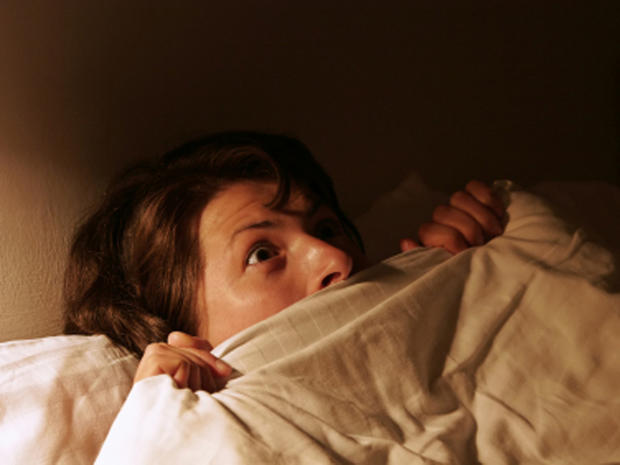Can't sleep? You may be afraid of the dark, study suggests
(CBS News) Do you have a hard time sleeping? Are you afraid of the dark? Researchers now think there's a link between the two problems.
More than half of the college undergraduate students involved in a new study who reported not being able to sleep also were shown to have a fear of the dark, measured by blink responses to sudden noise in dark and bright surroundings. Good sleepers were able to adjust to the noises, but bad sleepers were severely affected by it.
"The poor sleepers were more easily startled in the dark compared with the good sleepers," Taryn Moss, the study's lead author and a psychology researcher at Ryerson University in Toronto, said in the press release. "As treatment providers, we assume that poor sleepers become tense when the lights go out because they associate the bed with being unable to sleep. Now we're wondering how many people actually have an active and untreated phobia."
The preliminary findings from Ryerson University Sleep and Depression Lab were presented today at SLEEP 2012, the 26th annual meeting of the Associated Professional Sleep Societies (APSS) in Boston.
For the experiment, 93 students - 76 percent female - were asked to complete a survey that measured their fear of the dark and their sleeping habits. Twenty-six percent of good sleepers, and 46 percent of poor sleepers said they were afraid of the dark.
All subjects were exposed to four sudden bursts of white noise in dark and light situations and their eyeblink responses (e.g. speed, size and frequency - known as eyeblink latency) was measured.
"If you are nervous, you are going to flinch," study co-author Dr. Colleen Carney, an assistant professor of psychology at Ryerson University, told WebMD.
In the group who reported poor sleep, eyeblink response rates were slower when subjects were faced with the second unexpected burst of noise than the first time they were exposed to it, while good sleepers increased their eyeblink response from the first dark situation to the second. That suggests good sleepers were more likely to get used to the burst of noise than poor sleepers.
"The poor sleepers actually became more afraid," Carney said.
Researchers added that more studies were needed to see if fear of the dark increases the chances of getting insomnia and whether or not phobia treatment may be a cure for insomnia for some people.
"We may need to add treatment components for these patients and adapt existing treatment components in light of the phobia," Carney said in the news release. "A lot more research is needed, but we believe we have stumbled across an unmet treatment need for some poor sleepers."

